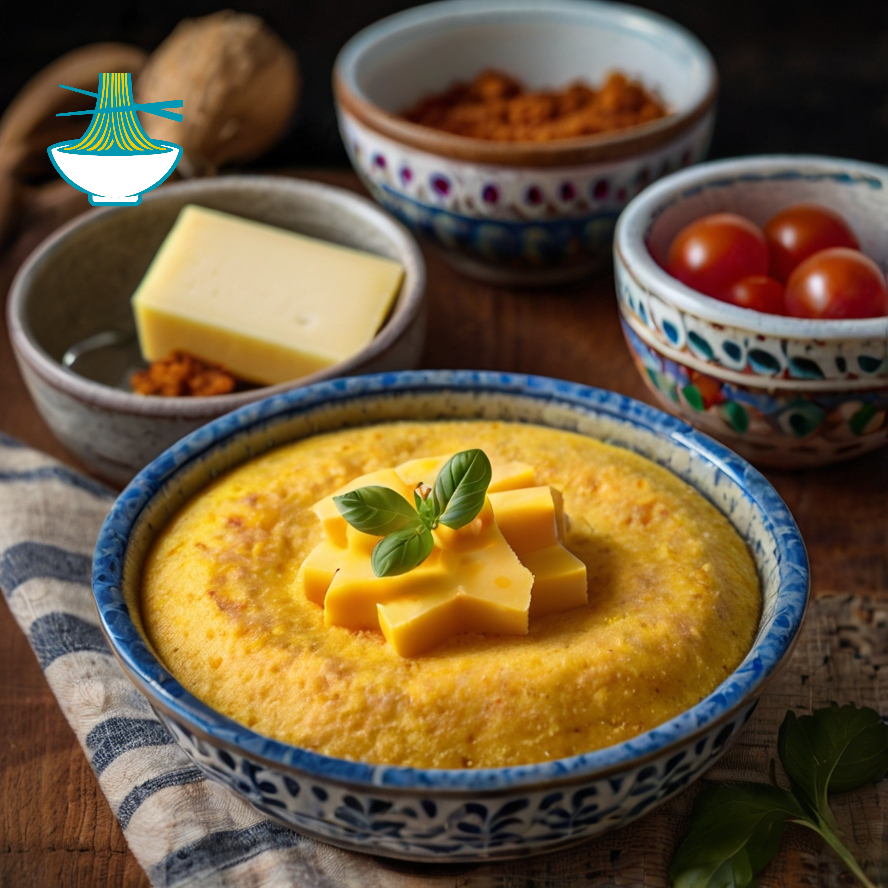Discover the authentic flavors of Kacamak, a traditional cornmeal dish popular in Balkan and Eastern European cuisines. This hearty and comforting recipe, often served with cheese or yogurt, is perfect for a cozy meal. Learn how to make this simple yet delicious dish with our easy step-by-step guide.
Ingredients:
- 2 cups cornmeal
- 4 cups water
- 1 teaspoon salt
- 2 tablespoons butter
- 1 cup crumbled cheese (such as feta or cottage cheese) or plain yogurt
- Optional: chopped fresh herbs for garnish
Instructions:
Prepare the Cornmeal Base:
- In a large pot, bring 4 cups of water to a boil. Add salt and reduce the heat to medium.
- Gradually add the cornmeal while continuously stirring to prevent lumps from forming.
- Cook the mixture on low heat, stirring constantly, for about 15-20 minutes until the cornmeal thickens and pulls away from the sides of the pot.
Add Butter:
- Once the cornmeal is fully cooked and thickened, stir in the butter until it melts and is well incorporated.
Serve:
- Spoon the Kacamak into serving bowls. Top with crumbled cheese or a dollop of yogurt.
- If desired, garnish with fresh herbs.
Enjoy:
- Serve the Kacamak warm as a main dish or side. It pairs well with grilled meats or vegetables.
Notes:
- For a richer flavor, you can also add a little cream or milk to the cornmeal mixture while cooking.
- Kacamak can be served with various toppings, including sour cream or sautéed onions.
Enjoy this comforting and traditional dish that's both simple and satisfying!
Nutritional Values
Cornmeal
- Calories: 120
- Carbohydrates: 26 grams
- Protein: 2.5 grams
- Fat: 0.5 grams
- Fiber: 2 grams
Benefits:
- Rich in carbohydrates, providing a good source of energy.
- High in fiber, supporting digestive health and regularity.
- Contains essential vitamins and minerals, including B vitamins, iron, magnesium, and phosphorus.
Water
- Calories: 0
- Carbohydrates: 0 grams
- Protein: 0 grams
- Fat: 0 grams
Benefits:
- Essential for hydration and maintaining bodily functions.
Salt
- Sodium: ~2,300 milligrams
Benefits:
- Helps maintain electrolyte balance and proper muscle and nerve function.
Note: Excessive salt consumption can lead to health issues, so use in moderation.
Butter
- Calories: ~102
- Carbohydrates: 0 grams
- Protein: 0 grams
- Fat: 11.5 grams
- Saturated Fat: 7.2 grams
Benefits:
- Provides vitamins, especially vitamin A, which is essential for vision and immune health.
- High in fat, offering a dense source of energy.
Note: Use butter in moderation due to its high saturated fat content.
Cheese (e.g., Feta or Cottage Cheese)
- Calories: 75
- Carbohydrates: 1 gram
- Protein: 4 grams
- Fat: 6 grams
- Saturated Fat: 3.5 grams
Benefits:
- Source of protein, helping to build and repair tissues.
- Provides calcium, supporting bone health and muscle function.
- Enhances flavor and richness of the dish.
Yogurt
- Calories: 150
- Carbohydrates: 12 grams
- Protein: 8 grams
- Fat: 8 grams
- Saturated Fat: 5 grams
Benefits:
- Contains probiotics that support digestive health and boost the immune system.
- Provides calcium, which is important for bone health.
- Source of protein, contributing to muscle repair and growth.
Fresh Herbs (Optional)
- Calories: 1
- Carbohydrates: 0 grams
- Protein: 0 grams
- Fat: 0 grams
Benefits:
- Rich in antioxidants, which help reduce oxidative stress and inflammation.
- Provides vitamins A, C, and K, as well as minerals like iron and calcium.
Incorporating these ingredients into Kacamak enhances its flavor and provides various nutritional benefits.


Comments